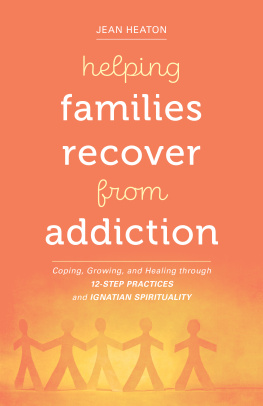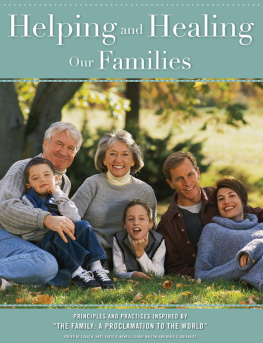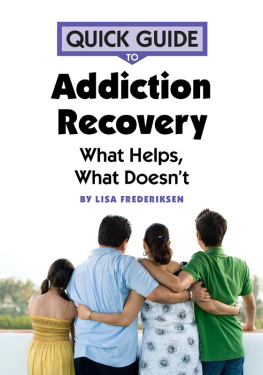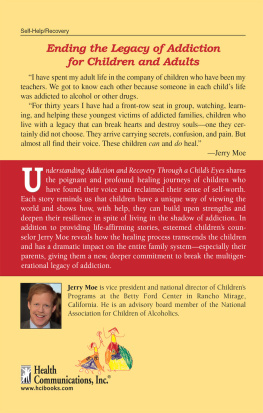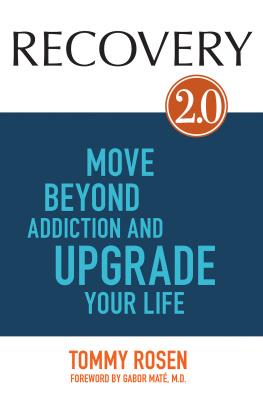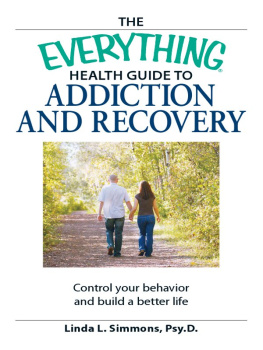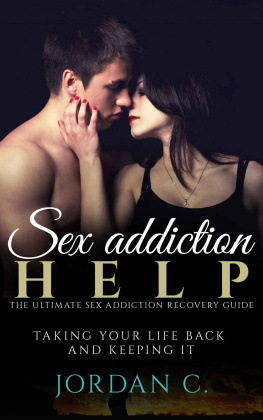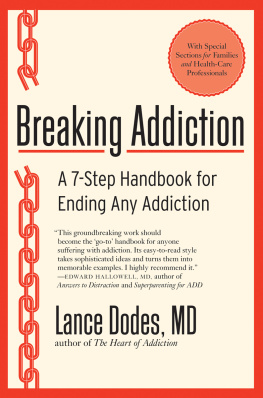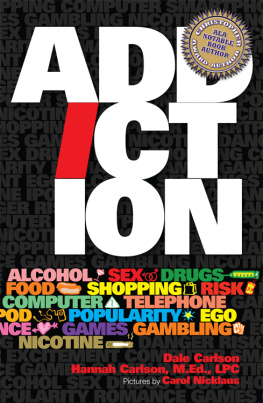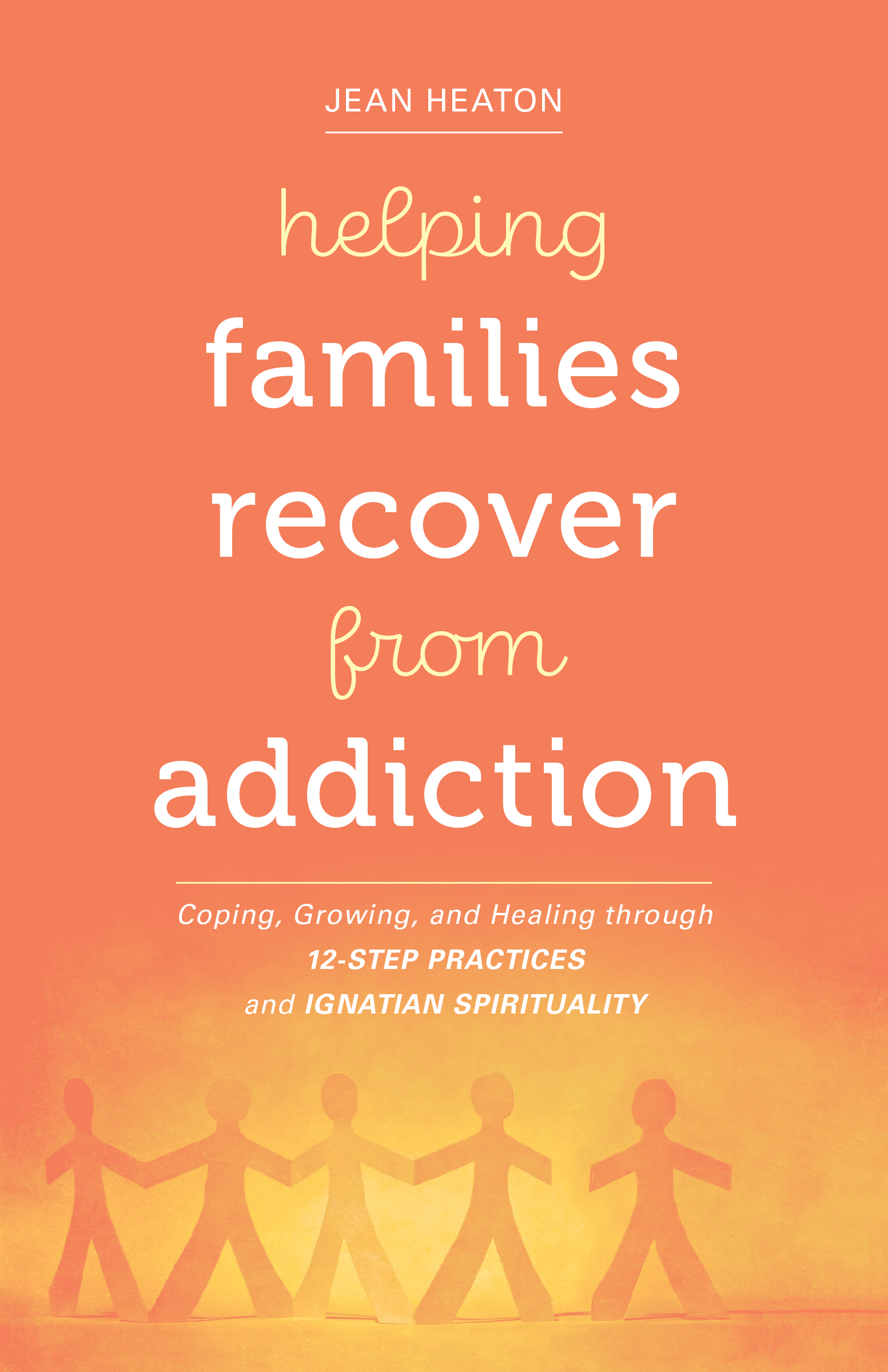

3441 N. Ashland Avenue
Chicago, Illinois 60657
(800) 621-1008
www.loyolapress.com
2020 Jean Heaton
All rights reserved.
Scripture quotations contained herein are from the New Revised Standard Version Bible: Catholic Edition, copyright 1993 and 1989 by the Division of Christian Education of the National Council of the Churches of Christ in the U.S.A. Used by permission. All rights reserved.
The Twelve Steps of Alcoholics Anonymous are adapted with permission of Alcoholics Anonymous World Services, Inc. (A.A.W.S.). Permission to adapt the Twelve Steps does not mean that A.A.W.S. has reviewed or approved the contents of this publication, or that A.A.W.S. necessarily agrees with the views expressed herein. A.A. is a program of recovery from alcoholism onlyuse of the Twelve Steps in connection with programs and activities which are patterned after A.A., but which address other problems, or in any other non-A.A. context, does not imply otherwise. Additionally, while A.A. is a spiritual program, A.A. is not a religious program. Thus, A.A. is not affiliated or allied with any sect, denomination, or specific religious belief.
The poem The Guest House on p. 125 is from The Essential Rumi Translations by Coleman Barks. Copyright 1995 by Coleman Barks. Reprinted by permission. All rights reserved.
Cover art credit: Catherine MacBride/Moment Open/Getty Images
eBook ISBN: 978-0-8294-4927-3
Based on the print edition: 978-0-8294-4926-6
Library of Congress Control Number: 2020943067
20 21 22 23 24 EPUB 5 4 3 2 1
To my family: past, present, and future.
We live in a world where most people still subscribe to the belief that shame is a good tool for keeping people in line. Not only is this wrong, but its dangerous. Shame is highly correlated with addiction, violence, aggression, depression, eating disorders and bullying.... If we can share our story with someone who responds with empathy and understanding, shame cant survive.
Bren Brown, Daring Greatly
One afternoon a couple of years ago, I was reading a book upstairs in our bonus room. It was a cold day, but I had a dog tucked on either side of me keeping me warm. My phone dinged, alerting me to a text message. It was from a young mom I knew from church. She was trying to remember a prior conversation wed had about the cause of addiction, since she knew my family had experienced it firsthand with my sons addiction.
There are many theories on the cause, I told her. More and more, Ive read that toxic shame is at the root of all addictions.
Thats it. I remember now, she said.
As we continued to text, there was something about the direction of the conversation that caught my attention. I couldnt really put my finger on it, but it made me feel as if I needed to be on guard.
She asked about the kinds of people who talked to me about my experience and the kinds of things they wanted to know. Her comments and questions seemed to dance around judgment, whether real or imagined. So, I decided to give her what I figured she wanted to hear. No more dancing, I thought. I will just dive right in.
Most people are just curious about what I did wrong, I texted, expecting that she would be as offended by that statement as I was as I typed it.
Rapid-fire, she wrote back, What did you do wrong? That is something I would be interested in hearing.
For the record, texting conversations can be difficult to read without seeing someones facial expression or hearing her tone of voice. I guess I got what I deserved, texting glibly and leaving myself open to her response. However, the direct nature of her words both stung and shocked me.
Thankfully, we werent able to go any further because she got a phone call. I am certain that was Gods grace because I needed time to sit with our conversation. More importantly, I needed to unpack my feelings.
I tried to place myself in her shoes. This young mother couldnt understand the stigma that surrounds addiction. She hadnt been on the other side of it. Shed never heard the pejorative language used to describe alcoholics or addicts applied to her child. I knew I felt hurt by the situation, yet I also knew I had been the one to open the door and invite it in. She was unsuspecting of my sarcasm and trusted me, but I had expected the worst of her. I was the one doing the judging.
This is why I cant trust people from church, I thought. My anger began to boil, so I took a deep breath and figured I should pray for her. I didbut for good measure, I asked for a little help for myself, too.
Soon, I felt my heart begin to soften. The anger started to subside as my vision began to clear. Perhaps I heard God laugh as well. Truthfully, the thing that had once felt so devastatingmy sons addictionhad become life-changing. I had been itching to share what it had brought into my life, but I hadnt yet pinpointed what I could give to others that would be of value. So, why, when this young woman asked me that question, did it offend me so?
I remembered that a few weeks before, I couldnt wait to watch the Diane Sawyer interview with Dylan Klebolds mother (of the Columbine High School shooting). I wanted to hear what she had to say, not so I could judge or look down on her. No, I wanted to know what not to do, just as this young mother from church wanted to learn from me.
What is it we need to do to keep our kids safe? How can we keep them from making choices that could ruin their lives? I think those are questions to which all parents would like the answers.
During the years of my sons active addiction, I read blogs written by parents who were affected by a childs drinking and/or drug use. These parents carried a lot of regret, shame, and blame on their shoulders. They searched high and low for a way to help their kids battle the disease. They went to doctors, tried rehab after rehab, talked to counselors, attended twelve-step meetings, and basically wore holes in the knees of their pants praying for their loved ones. With addiction, there are so many variables at play. We grasp at straws, trying different things to fix our loved ones.
Perhaps the sting I felt from the womans question was a reaction to my own questions. Did I do something that had harmed my child so severely that he ran to drugs and alcohol to escape? That question had gnawed at me for some time. I was too afraid to utter it out loud, and now she had directed it towards me with such ease: What did you do wrong?
My twelve-step group taught me that with this disease, we need to remember we didnt cause it, we cant cure it, and we cant control it. In the program, these are referred to as the three Cs. But there is a fourth C. We can contribute to it. And that is something we can change. I still have influence over my actions.
So, what did I contribute to my loved ones disease?
In all honesty, a lot. Of course, it was never my intention to hurt my child. But my actions may have been wrong in ways I didnt even know. The good news is that there are things we can do that aid our own recovery. In turn, our loved ones will be affected by our positive changes. We can learn new ways that will contribute to our loved ones recovery instead of the disease.

